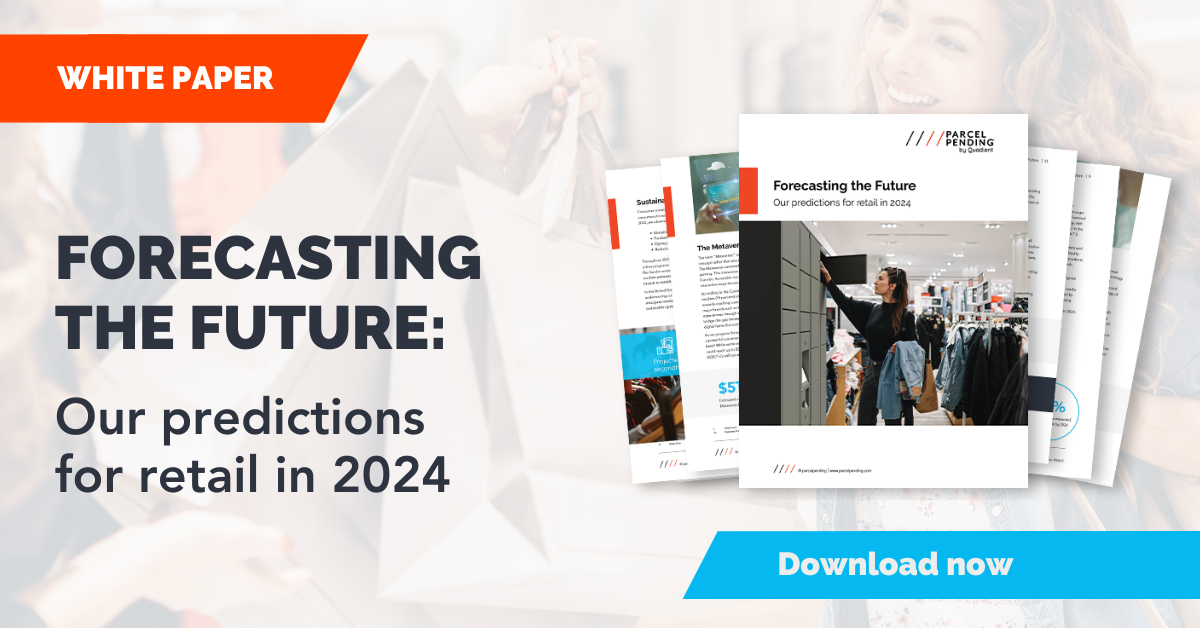
Our Blog
Top 3 retail innovation predictions for 2024
Written by: Parcel Pending
4 Min Read
Published: June 14, 2024
Updated: October 10, 2024
In the past decade, we’ve witnessed remarkable transformations in the retail landscape, driven by the ever-growing influence of digital technology. Today, the convergence of digital and physical shopping experiences has become the norm, presenting new opportunities and challenges for retailers striving to meet evolving customer needs.
In the wake of the COVID-19 pandemic, retailers are reevaluating their strategies to navigate this dynamic landscape effectively. From the rapid expansion of e-commerce options to the integration of cutting-edge technologies, like artificial intelligence (AI), the retail industry is evolving profoundly. To help retailers successfully navigate 2024, we’ve compiled a list of the top three emerging tech trends we foresee having the most significant impact on retail this year.
Hyper-personalisation marks a new era for retailers
The era of the one-size-fits-all approach is long gone. Personalization has emerged as the cornerstone for designing strategies that place consumers at the heart of all decisions and interactions. This foundational shift enables brands to connect deeper with consumers, fostering repeat purchases, customer loyalty, and heightened engagement. This consumer-centric focus has evolved into the central theme of retail strategies, and 2024 is no exception.
2023 demonstrated a few challenges, as seen in a survey of 103 retail executives conducted by Mastercard between May and June of 2023. The survey found that one in three executives felt their sites were not optimised for personalisation, with as many as 31% reporting that they were unable to align e-commerce and in-store touch points, up from 23% in 2022. However, in 2024, we foresee more investment in hyper-personalisation, whereby brands harness customer data, analytics, AI, and automation to craft customized and targeted customer experiences.
This approach equips brands with enhanced capabilities to deliver hyper-specific communications through preferred channels precisely when customers seek them, whether it’s through personalised emails, mobile app notifications, or even in-store locker pickup options. Beyond fortifying existing customer relationships, hyper-personalisation fosters new connections, ultimately elevating the customer experience to drive more loyalty and revenue.
AI’s influence will mark new beginnings in retail
In 2024, integrating AI in retail presents promising opportunities and substantial challenges. While retailers and consumers continue to grapple with concerns regarding data privacy and ethical implications associated with AI, the key lies in adopting a balanced approach.
In recent years, AI has become a staple in retail, with brands quickly integrating it to optimise different areas of the pre-purchase shopping experience, such as chatbots and service requests, thereby enhancing overall operational efficiency. This year, AI is poised to become an essential ally for retailers, emerging as a competitive differentiator for brands vying for customer loyalty and increased sales. Integrating AI into retail strategies is a valuable asset that unlocks opportunities for digital and physical stores, such as product design creation, trend forecasting, or more personalised shopper journeys.
Although there is much positive to come from AI, several concerns have surfaced, from governance and risk management to customer trust issues. Notably, research conducted by Deloitte revealed that trust in a brand decreased by 144% when customers were aware a brand was using AI. Additionally, a Salesforce survey of 14,300 global consumers and business buyers found that 74% of respondents expressed concerns about the unethical use of AI, with 68% believing that AI makes it more critical for companies to be trustworthy. It is imperative to navigate these challenges thoughtfully, ensuring that the benefits of AI are maximised while addressing potential drawbacks.
Buy now, pay later essential for consumers
Throughout 2023, there was a notable emphasis on enhancing checkout and post-purchase enhancements with the introduction of additional payment options. Flexible payment alternatives, such as Buy Now, Pay Later (BNPL), played a pivotal role in cultivating personalized experiences while advancing the omnichannel shopping experience, whether in-store or online.
This year, BNPL is anticipated to remain a critical investment focus, with projections indicating that 93 million individuals will make purchases totaling $81 billion through BNPL services in 2024, compared to 82 million consumers spending nearly $72 billion in 2023. BNPL has emerged as a significant purchasing avenue, particularly among Millennials and Gen Z consumers, driving its anticipated growth trajectory throughout this year.
To match consumer expectations, retailers are encouraged to prioritise investments in BNPL offerings to diversify payment methods, catering to evolving consumer preferences and ultimately fostering a higher potential for repeat customers and purchases.
More excitement to come in 2024
In the upcoming year, retailers are poised for another round of innovation as they strive to attract and resonate with consumers. With the expansion of BNPL options, new strategies in tech, and hyper-personalization, the foundation for a modernized retail experience is being made. As demonstrated, exceeding the status quo is needed to maintain customer loyalty and drive profits. As the year progresses, we can anticipate continued efforts from retailers to meet elevated customer expectations, driving innovation forward.



